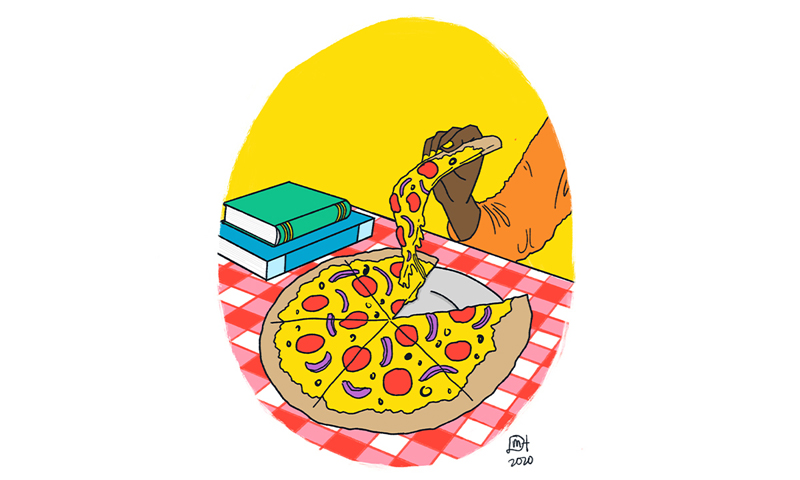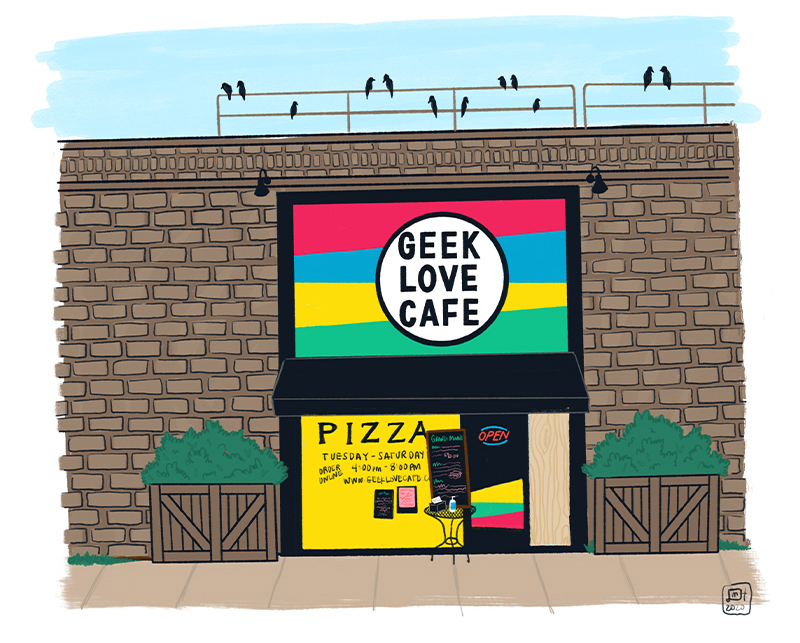Illustrations by Lora Marie Hlavsa
Funding for the Heavy Table’s Lake Street Profiles series is provided by a grant from Peace Coffee and the Coffee Creates Community initiative. Lake Street Profiles is Heavy Table’s ongoing six-part series of conversations with culinary business owners on or near East Lake Street in Minneapolis.
Moon Palace Books and its on-site Geek Love Cafe have had, as co-owner Jamie Schwesnedl puts it mildly, a year of highs and lows. Not only are he and his wife Angela managing to keep an independent bookstore and a restaurant afloat in the midst of a pandemic—their business is also located in the Longfellow neighborhood of South Minneapolis just 200 feet from the site of the burned-out Third Precinct, in an area that saw both unbelievable devastation and stood as the epicenter of a global revolution over the course of this summer’s protests. From the very beginning, Jamie and Angela didn’t hesitate to lend a hand to the resistance, churning out pizza for hungry protesters.
 “There are things that having a licensed kitchen makes it possible to do that we feel like it’s worth it, even if we’re losing a little money,” says Jamie. “What’s the point of having this business if you can’t feed people when they need it?”
“There are things that having a licensed kitchen makes it possible to do that we feel like it’s worth it, even if we’re losing a little money,” says Jamie. “What’s the point of having this business if you can’t feed people when they need it?”
Waking up to the news of George Floyd’s murder on the morning of May 26, the pair instantly prepared for a battle right outside their front door. “The restaurant was gonna be open [that day] and we were just like, ‘Alright, if you order a pizza from us we will make two pizzas for the protesters.”
Geek Love Cafe opened just back in April of 2018 as an extension of Moon Palace, and within a year were already being heralded for turning out some of the city’s best pizzas. Though COVID forced them to pare down their menu from 10 to four pizza offerings, Jamie says they aimed to still provide something for everybody. Diners can go the classic route, with either a cheese or pepperoni pie, or go for a specialty Travis McGee—pesto, tomato, mozzarella, and parm—or their most popular Almanac of the Dead, touting roasted beets, goat cheese, mozzarella, and habañero honey. The unique array of flavors on the latter all worked in harmony with one another, supported by a pretty stellar crust that struck the hard-fought balance of a light, airy chewiness with enough backbone to hold the weight of the regionally sourced ingredients.
Jamie says that, after expanding the original concept for the bookstore to allow for weekly events, the opportunity for an on-site cafe quickly became apparent. “We used to be next door to Peace Coffee, which was really great—except if we had a really successful event, like if 50 people came, it’s not like they could all go get coffee next door, because that would take like over an hour,” says Jamie. “So how do we have a thing where there’s the possibility of getting refreshment that’s designed more to serve the literary events?”
 Since opening the bookstore in 2012, he and Angela have made the needs of their community a priority of their decision-making. “If we’re going to […] take up this much space, how can we make that feel more meaningful and justifiable than just selling some books that we like?” he asks. “So that really helped us clarify the community aspect of it.”
Since opening the bookstore in 2012, he and Angela have made the needs of their community a priority of their decision-making. “If we’re going to […] take up this much space, how can we make that feel more meaningful and justifiable than just selling some books that we like?” he asks. “So that really helped us clarify the community aspect of it.”
Having completely moved both businesses to online and in-person pick-up after the pandemic made a crash-landing in March, Jamie says they had just dialed in their system when the protests and riots started at the end of May. With this year’s sales being as unpredictable as they’ve ever been, their survival is determined on a day-to-day basis. “One week we’ll be like ‘we’re totally going to make it through this year!’ Then a month later we’ll be like ‘man, are we gonna make it through this year?’” (The shop’s struggle hasn’t gone unnoticed—last week Moon Palace was named Midwest Booksellers of the Year by the Midwest Independent Booksellers Association.)
In the days and weeks that followed Floyd’s murder, Moon Palace saw its highest number of orders in a one-month period, spanning titles on racism and police abolition like “How to Be an Antiracist”, “The End of Policing”, and “Are Prisons Obsolete?”. This tidal wave of orders brought the shop some much-needed business, but brought with it its own myriad of obstacles, given the ruined state of the neighborhood and a ever-persisting pandemic.
“We couldn’t send anything because the post office was destroyed, and we didn’t receive any packages for two weeks,” Jamie says. “Our staff couldn’t come into work, all the power was out in our building for a day, so we had to throw out all the food in the restaurant walk-ins and freezers. The neighborhood was so devastated—just the air was unbreathable.”
Still reeling from the damage to their neighborhood while dealing with an overwhelming amount of orders, Jamie says it took their small staff of five—plus some helpful family members—until mid-August to ship everything out. “It was just this thing of suddenly in one week not having all the books that people had ordered, to having literally five thousand boxes of books that we had to open and scan into the system, and then trying to figure out which ones go to which orders. And doing that while everyone’s staying 10 feet away from each other and wearing masks. It was just really challenging.”
They’ve barely had enough time to take a breath, let alone get a clear look at how the summer’s sales factored into their finances. “We’re just like, ‘Do we have enough money to make payroll? Alright, let’s keep going.’”
Between the two businesses—the cafe run by Jamie, bookstore headed up by Angela—Jamie says Geek Love has definitely taken more losses this year. But with book sales recouping the loss and a small kitchen that can only crank out limited orders anyway, they decided to keep the cafe open for takeout in order to keep feeding their staff and neighbors, and keep things running in the hopes that COVID will one day be a dark chapter of our past. But also competing for the forefront of their minds is preparation for what might be needed in the months ahead. “We’re just looking at this year ahead and this winter and the economy, the political situation […] I don’t know, is this gonna become a breadline?”
Though the future could be bleak, Jamie expresses a steadfast determination to respond to whatever may come, noting their readiness to lend out their own store as a community gathering space if need be. “We have always tried to be, as we say, a neighborhood bookstore,” he says. “In these next five years to 10 years, a lot of really unexpected things could happen. This will put us in a position to respond, and to really add something to the capacity of our community to respond.”
He says with a scoff that the response from local government in the aftermath of the protests was disappointing, to say the least. “I think 2020 has been a consistent reminder that government is not agile or responsive to new situations,” he says. Far from offering any significant support or assistance over the summer, he bitterly recalls the only communication they got were petty citation warnings from their state or city officials. “I would say we have received more letters from the city demanding that we immediately remove graffiti or cut down weeds behind our building along the alley,” he says. “For months, that was the main official correspondence that we received.”
In the absence of any support from those at the top, Jamie says grassroots organizations and neighborhood associations like the Longfellow Business Association and Longfellow Community Council have been the most successful in both providing assistance to affected businesses and bringing City Council members like Alondra Cano, Cam Gordon, and Andrew Johnson into the fold. He specifically credits the Lake Street Council for being quick to act on behalf of local businesses. “They’re generally always responsive, and right away they’ll put out social media [posts] and bulk emails just being like, ‘If you need help, just let us know what you need.”
Having weathered a year of seemingly impossible scenarios, Jamie says they’re ready to keep serving their community however they can with pizzas and freshly baked bread in hand. “We don’t know what’s ahead this year. One thing we have is a huge Hobart mixer and big brick ovens, and we can bake a lot of bread in a pinch. It does seem potentially like that’s something that’s going to be needed this winter,” he says. “Whether it’s because people can’t afford to buy bread, or because there aren’t places for them to go to get it, or trying to feed people that are fighting the fascists in the street [laughs]. I don’t know.”

